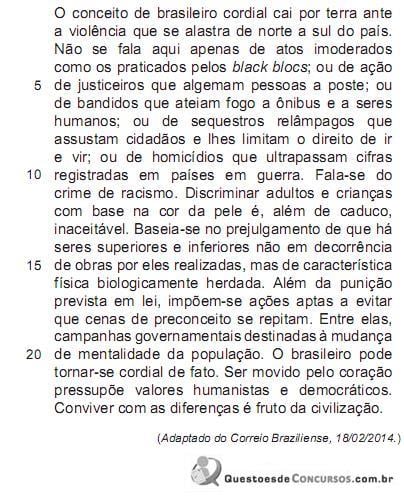Questões de Concurso Comentadas para receita federal
Foram encontradas 826 questões
Resolva questões gratuitamente!
Junte-se a mais de 4 milhões de concurseiros!
A Receita Federal nem sempre teve esse (1) nome. Secretaria da Receita Federal é apenas a mais recente denominação da Administração Tributária Brasileira nestes cinco séculos de existência. Sua criação tornou-se (2) necessária para modernizar a máquina arrecadadora e fiscalizadora, bem como para promover uma maior integração entre o Fisco e os Contribuintes, facilitando o cumprimento expontâneo (3) das obrigações tributárias e a solução dos eventuais problemas,bem como o acesso às (4 )informações pessoais privativas de interesse de cada cidadão.O surgimento da Secretaria da Receita Federal representou um significativo avanço na facilitação do cumprimento das obrigações tributárias, contribuindo para o aumento da arrecadação a partir (5) do final dos anos 60.
(Adaptado de
 Acesso em: 17 mar. 2014.)
Acesso em: 17 mar. 2014.) Sem __1__ pujança econômica de outrora, __2__ Europa registra nos últimos tempos o fortalecimento de pressões xenófobas e anti-imigração.Após __3__ crise global, iniciada em 2008, e o consequente aumento dos índices de desemprego no continente, grupos de extrema- direita conquistaram níveis inéditos de participação nos Parlamentos nacionais da Suécia e da Grécia.Não satisfeitos em exercer__4__ representação política, tais agremiações têm protagonizado lamentáveis episódios de agressão__5__minorias de outras nacionalidades.
(Adaptado de Folha de S. Paulo, 12/02/2014.)

In order to assist its Members improve the effectiveness of their enforcement efforts and achieve a balance between control and facilitation, the World Customs Organisation has developed a comprehensive technical assistance and training programmes. In addition, it has established Regional Intelligence Liaison Offces (RILOs) that are supported by a global database, the Customs Enforcement Network (CEN), to facilitate the exchange and use of information.
The WCO has also developed instruments for international co-operation in the form of the revised Model Bilateral Agreement (MBA); the Nairobi Convention, which provides for mutual administrative assistance in the prevention, investigation and repression of Customs offences; and the Johannesburg Convention, which provides for mutual administrative assistance in Customs matters. The WCO’s Customs Control and Enforcement programme therefore aims to promote effective enforcement practices and encourage co-operation among its Members and with its various competent partners and stakeholders.
(Source: http://www.wcoomd.org/en/topics/enforcement-and-compliance/ overview.aspx, retrieved on 12 March 2014.)
In order to assist its Members improve the effectiveness of their enforcement efforts and achieve a balance between control and facilitation, the World Customs Organisation has developed a comprehensive technical assistance and training programmes. In addition, it has established Regional Intelligence Liaison Offces (RILOs) that are supported by a global database, the Customs Enforcement Network (CEN), to facilitate the exchange and use of information.
The WCO has also developed instruments for international co-operation in the form of the revised Model Bilateral Agreement (MBA); the Nairobi Convention, which provides for mutual administrative assistance in the prevention, investigation and repression of Customs offences; and the Johannesburg Convention, which provides for mutual administrative assistance in Customs matters. The WCO’s Customs Control and Enforcement programme therefore aims to promote effective enforcement practices and encourage co-operation among its Members and with its various competent partners and stakeholders.
(Source: http://www.wcoomd.org/en/topics/enforcement-and-compliance/ overview.aspx, retrieved on 12 March 2014.)